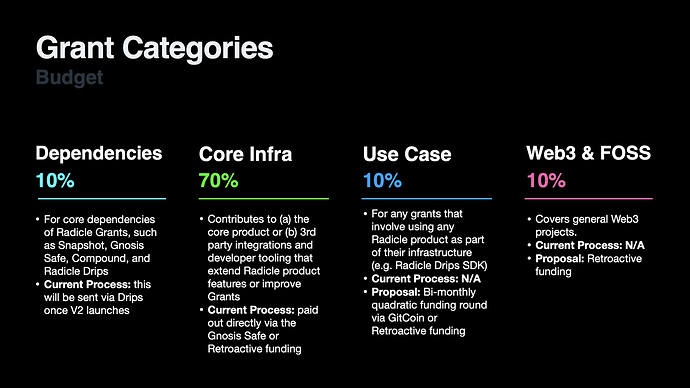Funding Categories + Processes
This is a proposal to define new processes depending on what type of grant we are funding.
This was borne out of the thoughts outlined below:
Proposal
As outlined below, we currently do not have a process for funding the following:
- Use Case Grants
- General Web3
Use Case Grants
Proposal
Allocate 10% of our budget (~100,000 USDC) for such grants using Quadratic Funding OR Retroactive Funding
Quadratic Funding:
- We work with GitCoin’s Round Manager to facilitate quadratic funding rounds on a regular basis (e.g. monthly). Launching around March/April 2023.
- This allows us to vote on a budget say 100,000 USDC, then allocate say 20,000 to each round, allow external parties to add funds/votes on grants, and also lets us set an upper limit on how much each team can get for matching funds (e.g. don’t hand out all 20,000 if only a single team applies, but do hand out upper limit of 5,000 USDC)
Retroactive Funding:
- We also allow such projects to come to us AFTER they have completed work for retroactive funding
General Web3
Use Case Grants
Proposal
Allocate 10% of our budget (~100,000 USDC) for such grants using Retroactive Funding
Retroactive Funding:
- We allow such projects to come to us AFTER they have completed work for retroactive funding
- The rationale here is that we don’t have the resources or bandwidth to review, monitor, and fund projects that are unrelated to Radicle’s core tooling and ecosystem. But there may be special cases that a team builds something genuinely useful, so we should be open to funding this work once it is useable.
Logistics
Voting
This proposal will be left up for the next 2 weeks.
After this, it will be divided into 2 separate SnapShot polls, open to current Radicle Grants OtterSpace badge holders. The Radicle Grants Snapshot page is here.
Management
This will include the following changes:
- Accounting: we will manually account for how much of our budget has been used on any given category (this could be automated in future) to make sure it remains within a reasonable % of budget, as outlined above.
- Management: we will work with relevant partners (GitCoin) to manage quadratic rounds, marketing to announce rounds, and as usual, manage any multi-sig components such as approving budget for funding rounds.
- Documentation: updates to our repo/documentation to help guide both grantees and committee members
Incentives
The obvious problem with this is that is introducing human-driven processes. This means it will require consistent management and consistent adherence to the proposal.
As with the entire Grants Program, the incentive for us to do so lies the existential nature of our roles on the committee. I expect that if we do not consistently manage these processes, we will be voted out.
